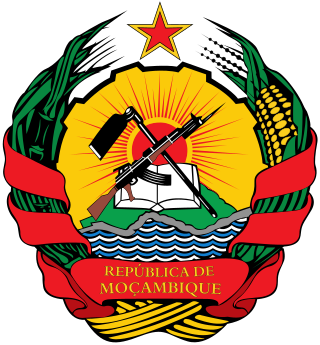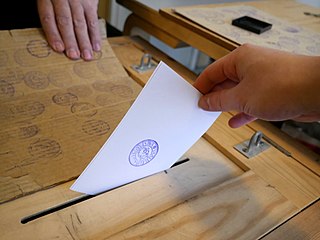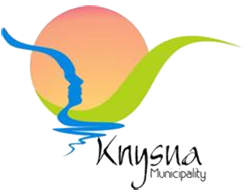
Politics in Mozambique takes place in a framework of a semi-presidential representative democratic republic, whereby the President of Mozambique is head of state and head of government in a multi-party system. Executive power is exercised by the government. Legislative power is vested in both the government and the Assembly of the Republic.
In many countries, a mayor is the highest-ranking official in a municipal government such as that of a city or a town. Worldwide, there is a wide variance in local laws and customs regarding the powers and responsibilities of a mayor as well as the means by which a mayor is elected or otherwise mandated. Depending on the system chosen, a mayor may be the chief executive officer of the municipal government, may simply chair a multi-member governing body with little or no independent power, or may play a solely ceremonial role. A mayor's duties and responsibilities may be to appoint and oversee municipal managers and employees, provide basic governmental services to constituents, and execute the laws and ordinances passed by a municipal governing body. Options for selection of a mayor include direct election by the public, or selection by an elected governing council or board.

There are four types of elections in Finland. Each Finnish citizen at least 18 years of age has the right to vote in each of the elections, which decide the following: the president, the parliament, the MEPs, and the municipal and city councils.
The elections in Taiwan each held every four years, typically in January and November. Since 2012 the previously eleven types of elections in Taiwan have been unified into general and local elections. There may also be by-elections. Electoral systems include first-past-the-post, proportional representation, single non-transferable voting, and a parallel mixture of the above.
Regular elections in Croatia are mandated by the Constitution and legislation enacted by Parliament. The presidency, Parliament, county prefects and assemblies, city and town mayors, and city and municipal councils are all elective offices. Since 1990, seven presidential elections have been held. During the same period, ten parliamentary elections were also held. In addition, there were nine nationwide local elections. Croatia has also held three elections to elect members of the European Parliament following its accession to the EU on 1 July 2013.

France is a unitary semi-presidential republic with a bicameral legislature. Public officials in the legislative and executive branches are either elected by the citizens or appointed by elected officials. Referenda may also be called to consult the French citizenry directly on a particular question, especially one which concerns amendment to the Constitution.
At a national level, Greece holds elections for its legislature, the Hellenic Parliament.
Some parts of the Government of Thailand are selected through democratic elections. These include the House of Representatives of Thailand,, local Administrations, Governorship of Bangkok and national referendums. Thailand has so far had 28 general elections since 1933; the last election was in 2023. Voting in elections in Thailand is compulsory. All elections in Thailand are regulated by the Election Commission of Thailand.
Elections in the Philippines are of several types. The president, vice-president, and the senators are elected for a six-year term, while the members of the House of Representatives, governors, vice-governors, members of the Sangguniang Panlalawigan, mayors, vice-mayors, members of the Sangguniang Panlungsod/members of the Sangguniang Bayan, barangay officials, and the members of the Sangguniang Kabataan are elected to serve for a three-year term.
Elections in Hungary are held at two levels: general elections to elect the members of the National Assembly and local elections to elect local authorities. European Parliament elections are also held every 5 years.

Elections in Lithuania are held to select members of the parliament, the president, members of the municipal councils and mayors, as well as delegates to the European Parliament. Lithuanian citizens can also vote in mandatory or consultative referendums.

Following the 2011 Tunisian revolution, elections in Tunisia for the president and the unicameral Assembly of the Representatives of the People are scheduled to be held every five years. The assembly can be dissolved before finishing a full term.

Knysna Municipality is a local municipality within the Garden Route District Municipality, in the Western Cape province of South Africa. As of 2011, the population is 68,659. Its municipal code is WC048.
The municipalities of Greece are the lowest level of government within the organizational structure of the state. As of 2021, there are 332 municipalities, further divided into 1036 municipal units and 6136 communities. Thirteen administrative regions form the second-level unit of government. The regions consist of 74 regional units, which mostly correspond to the old prefectures. Regional units are then divided into municipalities. The new municipalities may be subdivided into municipal units, consisting of the pre-Kallikratis municipalities. These were further subdivided into municipal communities and local communities according to population, but are simply named communities since the entry into force of the Kleisthenis I Programme on 1 September 2019.
A municipal council is the legislative body of a municipality or local government area. Depending on the location and classification of the municipality it may be known as a city council, town council, town board, community council, rural council, village council, or board of aldermen.

In France, a municipal council is an elected body of the commune responsible for "executing, in its deliberations, the business of the town" (translated).
The 2016 South African municipal elections were held on 3 August 2016, to elect councils for all district, metropolitan and local municipalities in each of the country's nine provinces. It was the fifth municipal election held in South Africa since the end of apartheid in 1994; municipal elections are held every five years.
The 2017 Georgian local elections were held on 21 October 2017 to elect the bodies of local government of Georgia: 2,058 members of representative councils (sakrebulo) and 64 mayors of municipalities. The votes went into second-round runoffs in six municipalities on 12 November 2017. The ruling Georgian Dream party won in all constituencies under the proportional contest and secured 62 out of 64 mayoral positions.

The first round of the local elections for mayors and municipal councilors on both the local and provincial level in Bulgaria were held on 27 October 2019. The second round of the election took place on 3 November, as per the decree signed by the President of Bulgaria. 6,227,901 Bulgarians were included on the voter lists and were eligible to vote, a 136,000 voter reduction compared to the 2015 local elections.
The electoral system of Hungary is the set of voting methods and rules used in Hungary, including mainly the system for electing members of the National Assembly : and local government elections. The Hungarian electoral system also includes the systems used for the European Parliament elections held in Hungary and the elections of minority local government elections, as well as the rules of referendums and similar initiatives. The president of the republic is not directly elected.








